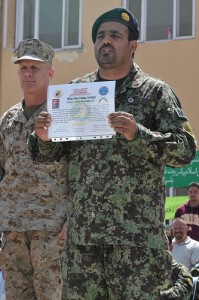Graham Throws Tantrum Over an Afghanistan With No Night Raids or US Control of Prisons
With most eyes yesterday on Super Tuesday and political wrangling over Iran’s nuclear technology, not many took notice of the update from Reuters Tuesday morning letting us know that an agreement on transfer detention faciliies to full Afghanistan control is expected by the end of this week. Lindsey Graham did notice the news,however, and chose to vent to Josh Rogin just before lunch.
Lindsey is not happy:
Graham, who has been one of the strongest congressional supporters for continuing the U.S. military mission in Afghanistan beyond 2014, said today that unless Karzai relents on his demands that the United States immediately hand over control of Afghan prisoners and end night raids against insurgents, there is no way the U.S. can achieve its objectives in Afghanistan and therefore should just end its involvement there.
“If the president of the country can’t understand how irrational it is to expect us to turn over prisoners and if he doesn’t understand that the night raids have been the biggest blow to the Taliban … then there is no hope of winning. None,” Graham said in the hallways of the Capitol Building just before entering the GOP caucus lunch.
“So if he insists that all the prisoners have to be turned over by March 9 and that we have to stop night raids, that means we will fail in Afghanistan and that means Lindsey Graham pulls the plug. It means that I no longer believe we can win and we might as well get out of there sooner rather than later.”
Graham gets so much wrong in his rant. He seems to think that the US is planning to hand over full control of the prisons on Friday. Reuters reports that the most likely agreement is for the process to start on Friday but take place over a six month period:
In a meeting Monday between Afghan President Hamid Karzai, U.S. ambassador Ryan Crocker and Gen. John Allen, the NATO commander in Afghanistan, the American side proposed a six-month timeline for the transfer.
Karzai was reported to have set a deadline of March 9 for the United States to hand over the detention facilities.
An Afghan official said that under one possible scenario, a transfer of prisons could start within the next few days and it may be completed within six months.
Next, Graham complains that the Afghans will merely turn insurgents loose to “start killing Americans again”, despite the fact that Afghanistan appears to hang onto some prisoners long enough to have built up quite a reputation for torture there.
And Graham seems to have forgotten that training has been a cornerstone of US policy in Afghanistan, presumably equipping the Afghans for the time when we could hand over prisons and other security arrangements to the Afghans so that we could go home. Read more →


